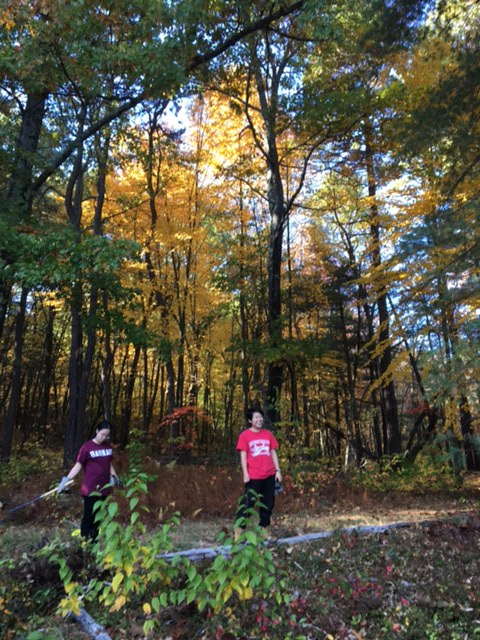Ecocide in Groton’s Backyard
Loggers have chopped down large numbers of trees in the Keyes Memorial Forest, home to rare species and valuable wetland habitat just across the street from Groton School. Currently, 20 of its 57 acres are being leased out to Thayer Wood Energy, a logging contractor, for a project that will take six to eight weeks. The New England Forestry Foundation (NEFF), which currently owns the land, worked with the Massachusetts Natural Heritage and Endangered Species Program (MNHESP) and a biologist to help make this project as environmentally friendly as possible. The forest’s natural habitat, however, is highly vulnerable to the various disturbances that will take place. Keyes Memorial Forest is an unfit location for this project because of the potential impact to its ecosystem.
More than one third of the Keyes Memorial Forest is wetland, according to Dr. Black, which means that there are more rare species than a typical plot. To protect the wetland, loggers will be using temporary skitter bridges. The MNHESP also restricted logging around more wetlands than the original plan, and created buffers (i.e. areas that will not be logged) to avoid harming rare species. Yet, these buffers are only 25 feet from the wetland, while the scientifically accepted standard, as explained by Dr. Black, is 300 feet.
Invasive species present another problem. Invasives such as honeysuckle and buckthorn already desecrate the forest, and logging will only make matters worse. Chris Pryor, a representative from the NEFF, said that the company will ensure that the habitat is regrowing healthily by monitoring the property periodically. Mr. Pryor elaborated, “this will include checking to see we are getting the regeneration that we were looking [for], growth response in the retained overstory trees, as well as monitoring that the invasives species are not taking over.” Nevertheless, according to Dr. Black, neither the contractor nor NEFF have written plans to do this, nor did they closely follow up on monitoring invasive species around this area after their last cut around 30 years ago, with Groton School clearing invasive species for the past few years instead. However, according to Mr. Pryor, it is possible regeneration had not been a goal, since not all timber harvesting has a desired goal of regeneration. He also explained that the company updates their management plans regularly, and that Keyes is scheduled to be updated in 2021.
When logging takes place, there are several ways that invasive species exploit the situation, argued Dr. Black. First, increased human activity will help spread invasives. Second, logging will disturb a large amount of land, helping invasives flourish. Third, soil will be disrupted by heavy machinery, and since invasives are well adapted to extreme environments, they grow well in disturbed soil. While Mr. Pryor believes that invasive species are a concern, he also added, “Eradication of invasives at Keyes… is not feasible or economical given the level of infestation there and on surrounding properties.”
Furthermore, logging may disrupt the natural behaviors of animals. In the fall, many animals stock up on food and prepare to hibernate, but with their habitat changed by logging, these tasks may be more difficult. On the other hand, other species would be affected if the logging were delayed until the winter. For example, the MNHESP has mandated that the logging must stop before February due to the cycle of the blue-spotted salamander, a species listed as special concern by the Massachusetts Endangered Species Act. Chris Pryor mentioned that logging was scheduled for the fall to protect water quality, so that salamander eggs in vernal pools will not be affected.
NEFF and MNHESP are trying to limit the effects of the logging, yet because of the wetlands, species, and size of the land, there is no way to gauge how severely the Keyes Memorial Forest will be affected. Mr. Pryor admitted, “when managing a forest, whatever you do is going to have winner and losers from a wildlife standpoint.” Though logging is a necessity in our world, certain places should be protected from exploitation in order to safeguard rare species. The Keyes Memorial Forest is one of these places.













